 Travel
Travel

Flower growing regions are an attractive destination for short getaways.
This time of the year, with the first chilly winds blowing through the north, the winter flower season signals travellers to hit the roads.
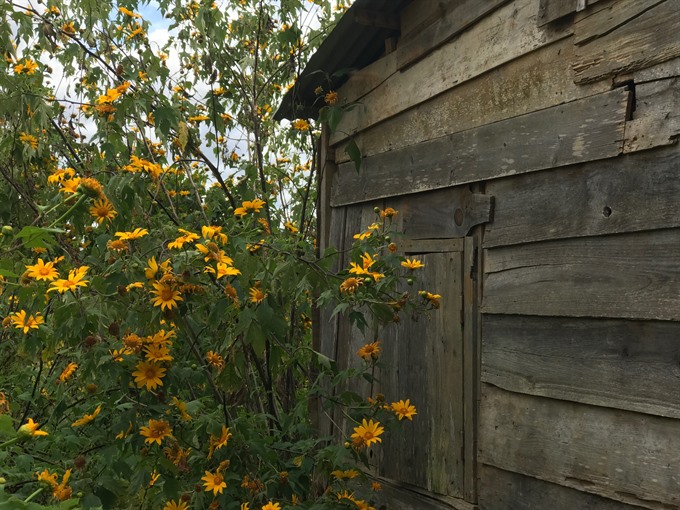 |
| Wild sunflowers have several names in local languages - dã quỳ, cúc quỳ, sơn quỳ, hướng dương dại. VNS Photo Trần Hoàng Nam |
By Lê Hương
Flower growing regions are attractive destinations for short getaways.
This time of the year, with the first chilly winds blowing through the north, the winter flower season signals travellers to hit the roads.
Immense fields of rape flowers, wild sun flowers, buckwheat and water lilies are in full bloom.
The buckwheat festival was organised in Hà Giang Province in mid-October, earlier than last year.
Yet at the beginning of October young people in Hà Nội gathered to head for the buckwheat fields in Hà Giang.
Bùi Thu Trà packed up her two children last weekend and went to Hương Pagoda, 70km to the southwest of Hà Nội. The four-kilometre stream that meanders through the mountainous countyside to the pagoda is full of waterlilies this time of year.
“It’s quite contrast to the busy atmosphere at the pagoda in spring. At the end of autumn, the Yến stream is so peaceful and romantic,” she said. “A boat trip along the stream decorated with purple waterlilies is really relaxing after the week’s hustle and bustle.”
The riotous flower displays are also a favorite backdrop for couples taking wedding photos.
“We are preparing a wedding album,” said bride Trần Mai Lan, “We decided to choose this site for shooting photos as the scene here is so beautiful. We also visit pagodas to pray for luck.”
Cross breed
Wild sunflowers are at their peak right now. From the central province of Quảng Nam to the Central Highland, from Bình Phước Province to Đắc Nông and Lâm Đồng provinces, or from Lâm Đồng Province to Kon Tum Province, the ground is covered by endless carpets of the yellow blooms.
On the outskirts of the Central Highland city of Đà Lạt, in the cool clear mornings, roads are lined with wild sunflowers, which also signal the start of the dry season in the area.
Wild sunflowers have several names in local languages - dã quỳ, cúc quỳ, sơn quỳ, hướng dương dại - though they originated in Mexico. They are popular in sub tropical climates of central America, southeast Asia and Africa.
Historical documents indicate the flower was first introduced in the Lâm Đồng Central Highland region by the French in the early 20th century. Thanks to its easily separated seeds, the plant soon spread far and wide.
The flower, comprising up to 13 petals measuring 10cm in diameter, is a cross between a daisy and sunflower. An amateur photographer in Đà Lạt said the best times to take photos of the flower are 9-10am or 3-4pm, when the petals open to their fullest.
“If you want to grow it at home, it’s very simple. Just pick some branches, put into soil and the new buds will come out soon,” he said, “Yet the smell of the plant is not pleasant to some people.”
That may explain why though wild sunflowers are beautiful and, some say romantic, they are not presented as gifts.
Legend of love
Locals in the central region associate the flower with a legend of love. Once upon a time, K’Lang and H’limh were a happy couple living in the jungle. One day, K’Lang went hunting and did not return. H’Limh went to look for him and found him sieged by the enemy Lasieng tribe.
Larihn, the son of the rival tribe’s leader, also loved H’Limh, but she did not return his love. Larihn shot a poisonous arrow at her lover, K’Lang. But it missed and hit her instead, killing her.
Every October, on the day H’Limh died, a bright yellow flower grows at the spot.
They can be found these days at the Đà Lạt-Vạn Thành flower village, the Tà Nung-Voi Waterfalls-Langbiang, in Trại Mát-Cầu Đất (in Xuân Trường District) 30km from Đà Lạt City. They also grace the sides of the Đà Lạt-Liên Khương National Highway 20.
The wild sunflower can also be found this time of year in Ba Vì National Park on Ba Vì Mountain, 60km west of Hà Nội’s centre. The flowers do not cover immense fields as they do in the Đà Lạt region. In Ba Vì the plants grow on bushes, creating walls of flowers.
The bright yellow bushes run from the foot of the mountain, along the main road, up to the peak. The hill, 700 metres high, is most beautiful when the plants are at their peak.
The French grew the plants when they started to build a church and villas on the mountain. The strong plant soon spread and has since been luring tourists at the beginning of winter. — VNS
|
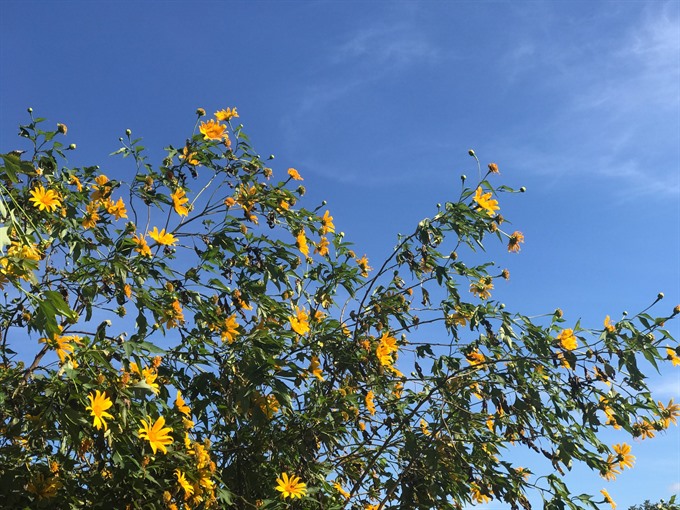 |
| On the outskirts of the Central Highland city of Đà Lạt, in the cool clear mornings, roads are lined with wild sunflowers, which also signal the start of the dry season in the area. VNS Photo Trần Hoàng Nam |
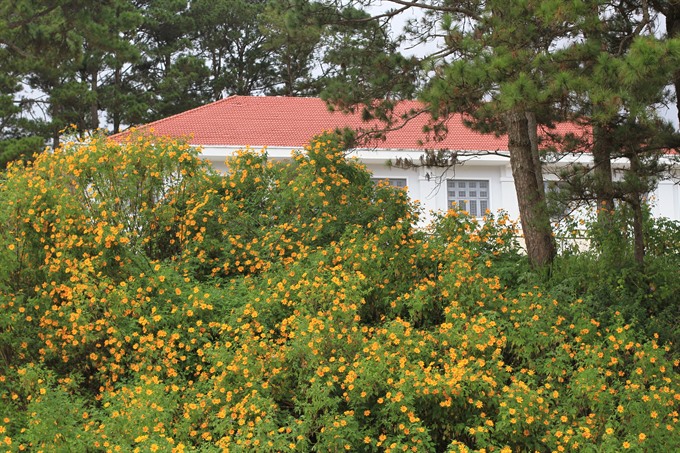 |
| Controversial smell: Wild sunflowers decorate villas in Đà Lạt. VNS Photos Phan Anh |
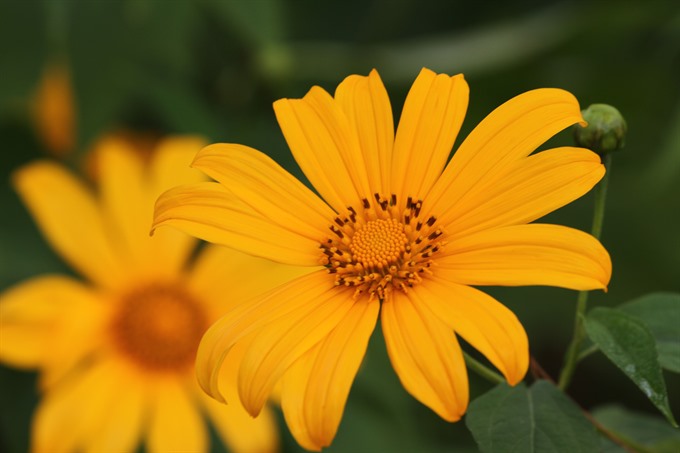 |
| Mexican origin: This small flower is a cross between a daisy and sunflower. VNS Photo Phan Anh |
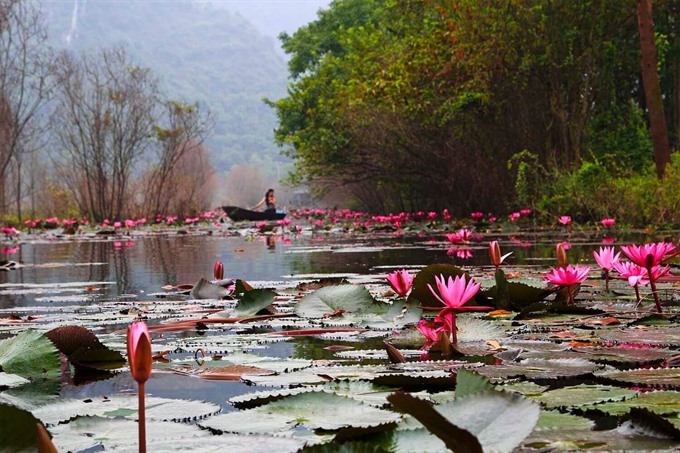 |
| Nature’s decor: Water lilies bloom on Yến Stream, 70km southwest of Hà Nội. VNS Photo Hải Hà |
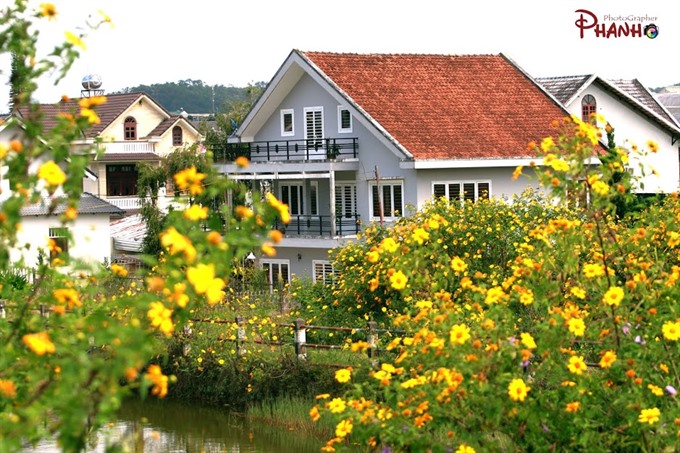 |
| Controversial smell: Wild sunflowers decorate villas in Đà Lạt. VNS Photos Phan Anh |
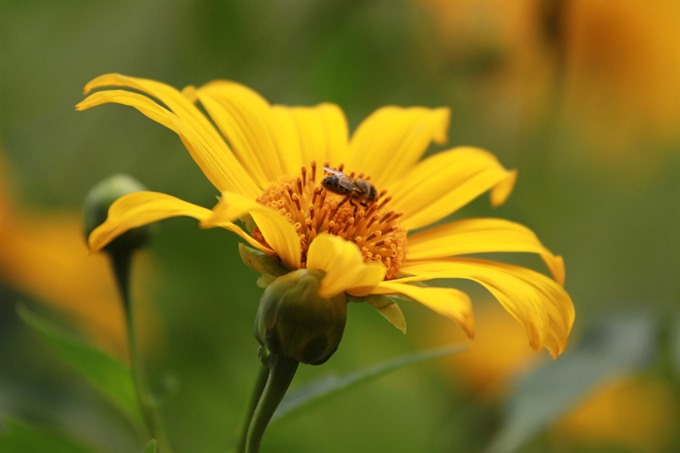 |
| Mexican origin: This small flower is a cross between a daisy and sunflower. VNS Photo Phan Anh |
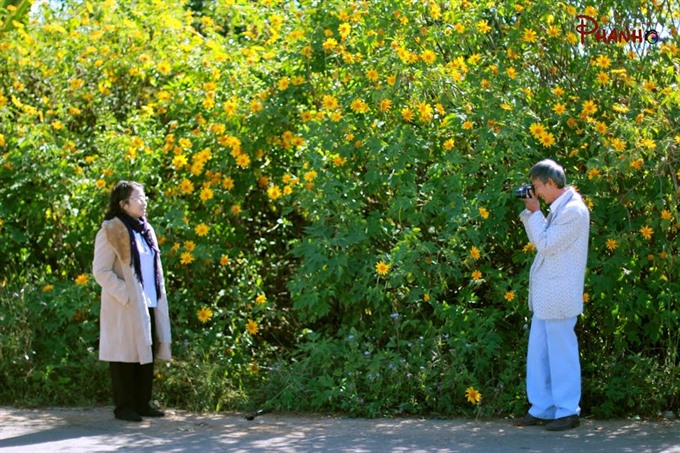 |
| Romantic backdrop: A couple take photos with wild sunflowers in Đà Lạt. VNS Photo Phan Anh |




